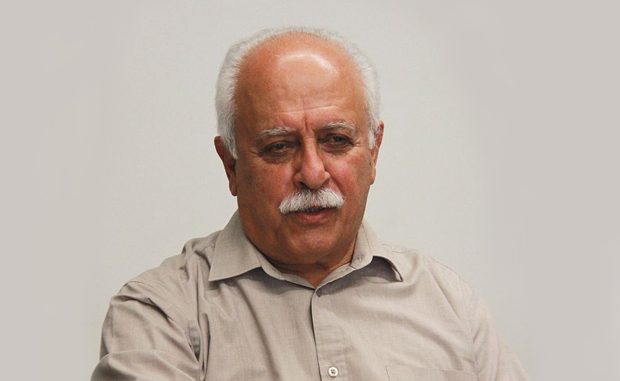
Bio Brief
Dariush Ashouri (b. August 2, 1938, Tehran) is an eminent Iranian intellectual, linguist, translator, encyclopedist, sociocultural activist, and Hafezologist.
Ashouri was born in Saqakhaneh Nowruzkhan, an old traditional district near the Central Bazaar of Tehran. He attended Khosravi and Razi elementary schools where he voraciously read books, from Auntie Beetle and Forty Parrots folktales to Rostam Nameh and One Thousand and One Nights. As his fascination with the world of fiction deepened, he gained intimate familiarity with the Divan of Hafez – the book stayed with him and grew roots for the rest of his life. Then he went to Alborz and Darolfonun high school and was awarded a diploma in literature in 1958. In the meantime, having read popular periodicals of the time such as Ettelaat newspaper, Saba magazine, Khandaniha, Mard-e-Emrouz, and Tudeh Party’s publications, he gradually gravitated towards Leninist Marxism. In 1957, he joined the Toilers Party of the Iranian Nation (also known as the Third Force). He was only in the sixth grade when he met Bahram Beyzaei as his classmate and felt deeply was moved by his interest in cinema and theater. Meanwhile, the literary personality and writing skills of some of his teachers such as Zeynolabedin Mo’tamen and Mahmoud Behzad inspired him to attempt writing and publishing them in Jahan-e-Now, Arash, and Ayandegan magazines.
Ashouri gained his Bachelor’s degree in Economics from the Law School of the University of Tehran in 1964. He was then employed by Plan and Budget Organization, taught at the colleges of Fine Arts and Social Sciences of the University of Tehran, and founded Nameh-ey Olum-e Ejtemai (Social Sciences Paper) at the University of Tehran. Given a recommendation by Dr. Gholamhossein Yousefi, he resigned from the Plan and Budget Organization to become a full-time academician at the University of Tehran and later, at the Dehkhoda Lexicon Institute until retirement. In 1985 he immigrated to France, but this did not mark an end to his literary and cultural activities. He has been an editor of Iranica, teaching at the University of Oxford’s Faculty of Oriental Studies, and writing for a number of Persian periodicals across the world. Throughout his fruitful life inside or outside Iran, Ashouri has always been concerned with issues of home, Iranian identity, and sociocultural problems of the country, and more importantly, of Persian language.
Biblio Brief
Books
- An Ontological Study of Hafez, (later re-titled as Erfan and Rendi in the Poetry of Hafez), Tehran: Markaz Publications, 1998 [هستی شناسی حافظ، عرفان و رندی در شعر حافظ]
- Rethinking Persian Language. Tehran: Markaz Publications, 1993.[بازاندیشی زبان فارسی]
- The Open Language: a research on language and modernity. Tehran: Markaz Publications, 2008. [زبان باز]
- Definitions and Concept of Culture. Tehran: Agah Pub. [تعریفها و مفهوم فرهنگ]
- Poetry and Thought. Tehran: Markaz [شعر و اندیشه]
- Modernity and Us. Tehran: Serat [ما و مدرنیت]
Translations
- Thus Spoke Zarathustra. Friedrich Nietzsche. Tehran: Agah Publications. [چنین گفت زرتشت]
- The Prince. Niccolò Machiavelli. Tehran: Agah Publications. [شهریار]
- A History of Philosophy, from Fichte to Nietzsche. Frederick Charles Copleston. Tehran: Elmi & Farhangi. [تاریخ فلسفه: از فیشته تا نیچه]
- Zur Genealogie der Moral. Friedrich Nietzsche. Tehran: Agah Pub. [تبارشناسی اخلاق]
- Macbeth. William Shakespeare. Tehran: Agah. [مکبث]
- Utopia. Sir Thomas More. [آرمانشهر: اتوپیا]
Articles on Hafez
- “A Few Points on the Interpretation of the Divan of Hafez,” Iran-nameh, 1998, vol. 7, pp. 684-679 [چند نکته در شرح دیوان حافظ]
- “The Worldview of Hafez,” Jahan-e-Ketab, issues 53/54, 1997, pp.62-63. [جهان اندیشهی حافظ]
- “The Enigma of Hefez,” Negah-e-Now, Issue 55, 2002, pp. 40-45. [معمای حافظ]
Sources
منابع معرفی شده در متن ؛ «داریوش آشوری : 75 سال زندگی بازبان وفرهنگ ایرانی » مصاحبه بامهدی جامی نک : http://www.bbc.com/persian/arts/2013/11/131118_l44_ashouri_anniversary_jami_interview
Translated from Persian by Farzaneh Doosti


Leave a Reply